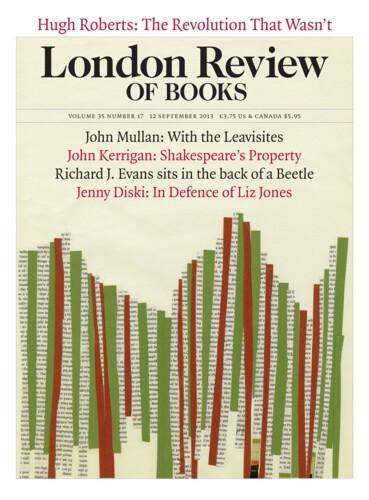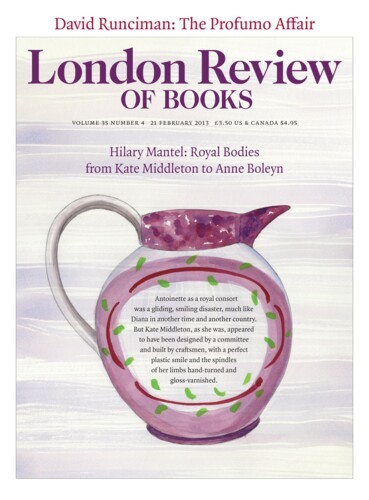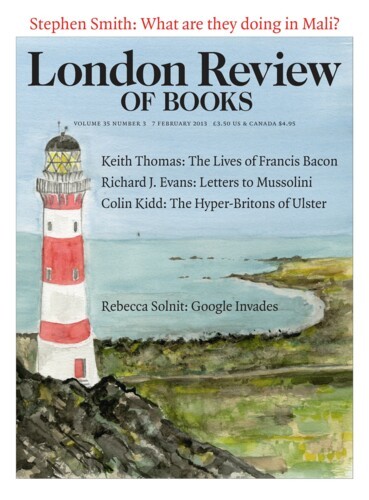Richard J. Evans
Richard J. Evans is Regius Professor Emeritus of History at Cambridge and a former president of Wolfson College. He is the author of numerous books, including The Pursuit of Power: Europe 1815-1914, Eric Hobsbawm: A Life in History and a three-volume history of the Third Reich.
Autoerotisch: The VW Beetle
Richard J. Evans, 12 September 2013
When I first went to Germany, in the early 1970s, the roads were swarming with squat, misshapen little beasts, bustling about the city streets or rattling along the autobahns with noisy, air-cooled engines, curved roofs tapering down to the rear bumper and, in older models, tiny oval back windows, so small that I wondered how the driver could see anything at all in his rear-view mirror. Their...
Marx v. The Rest: Marx in His Time
Richard J. Evans, 23 May 2013
Do we need another biography of Marx to go alongside the many we already have? The justification given by Jonathan Sperber is compelling. Previous accounts of Marx’s life have gone one of two ways. Either he is seen as a prophet of modern times, a seer whose theories help us understand the predicament we are in, especially in times of economic crisis, an inspiration to everyone who...
Thank you, Dr Morell: Was Hitler ill?
Richard J. Evans, 21 February 2013
In May 1941, after the sudden flight to England of Hitler’s deputy, Rudolf Hess, who had deluded himself that he could persuade the British to make peace, a joke went round Berlin. ‘So you’re the madman,’ Churchill says to Hess. ‘No,’ Hess replies, ‘only his deputy!’ That Hitler was insane was something many Germans came to believe in the later...
Kisses for the Duce: Letters to Mussolini
Richard J. Evans, 7 February 2013
Shortly after he was forced out of office in November 2011, Italy’s longest serving postwar prime minister, Silvio Berlusconi, told the press he was spending his time reading the last letters written by Mussolini to his mistress Clara Petacci. ‘I have to say,’ he confessed, ‘that I see myself in many aspects of those letters.’ In the Duce’s view, according to Berlusconi, Italy was ungovernable. ‘What sort of democracy is this?’ Mussolini had wondered. When a journalist suggested that it might not be entirely accurate to describe Mussolini’s Italy as a democracy, the former prime minister replied: ‘Well, it was a democracy in a minor way.’
Podcasts & Videos
Anthony Wilks's film traces the connections between the events of Eric Hobsbawm’s life and the history he told, from his teenage years in Germany and his communist membership, to the jazz clubs of 1950s...
From Cholera to Coronavirus
David Runciman and Richard J. Evans
David talks to the historian Richard J. Evans about the history of cholera epidemics in the 19th century and what they can teach us for today.
Pieces about Richard J. Evans in the LRB
I want to love it: What on earth was he doing?
Susan Pedersen, 18 April 2019
Was Eric Hobsbawm interested in himself? Not, I think, so very much. He had a more than healthy ego and enough self-knowledge to admit it, but all his curiosity was turned outward.
Echoes from the Far Side: The European Age
James Sheehan, 19 October 2017
Max Weber defined power as ‘the ability of an individual or group to achieve their own goals or aims when others are trying to prevent them from realising them’. The pursuit of...
Breathtaking Co-ordination: Hitler’s Wartime Economy
Jonathan Wright, 19 July 2007
Richard Evans’s history of the Third Reich – it will be completed by a third volume covering the war – is an invaluable work of synthesis. The mass of specialist studies we now...
Laid Down by Ranke: defending history
Peter Ghosh, 15 October 1998
Richard Evans hopes that this book will take the place of E.H. Carr’s What is History? and G.R. Elton’s The Practice of History as the ‘basic introduction’ to history as...
Axeman as Ballroom Dancer
David Blackbourn, 17 July 1997
In future times people will look back on the death penalty as a piece of barbarity just as we now look back on torture.’ These confident words were spoken by a member of the 1848 Frankfurt...
Germans and the German Past
J.P. Stern, 21 December 1989
The ‘white years’ of German history – the period between the end of the war and Adenauer’s first government of 1949 – were notable for two blank spaces in the...
Disease and the Marketplace
Roy Porter, 26 November 1987
In mid-August 1892, Hamburg was basking in a heatwave. Workers splashed around in the River Elbe, which reached an almost unprecedented 70°F. Then people started to go down with intestinal...
Read anywhere with the London Review of Books app, available now from the App Store for Apple devices, Google Play for Android devices and Amazon for your Kindle Fire.
Sign up to our newsletter
For highlights from the latest issue, our archive and the blog, as well as news, events and exclusive promotions.





